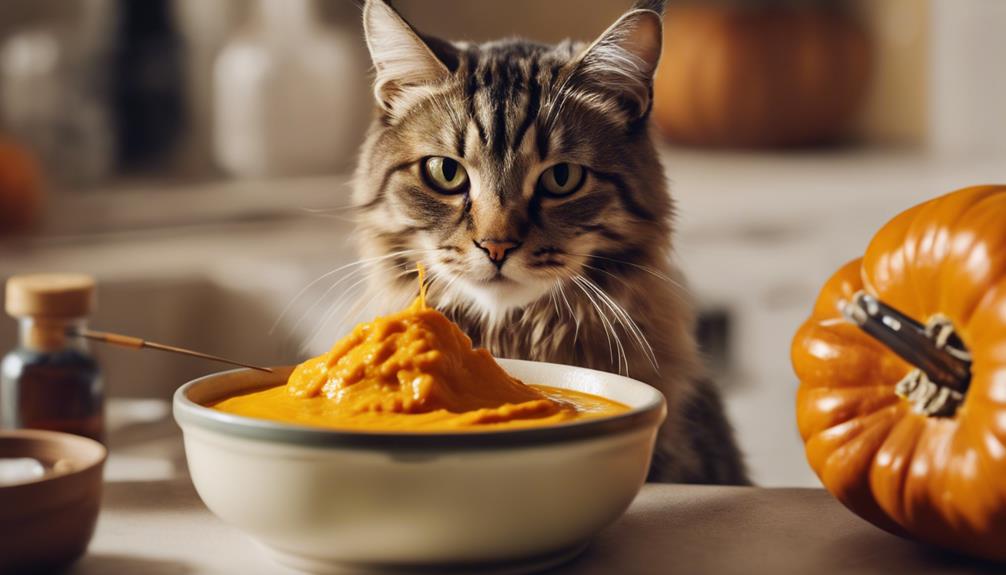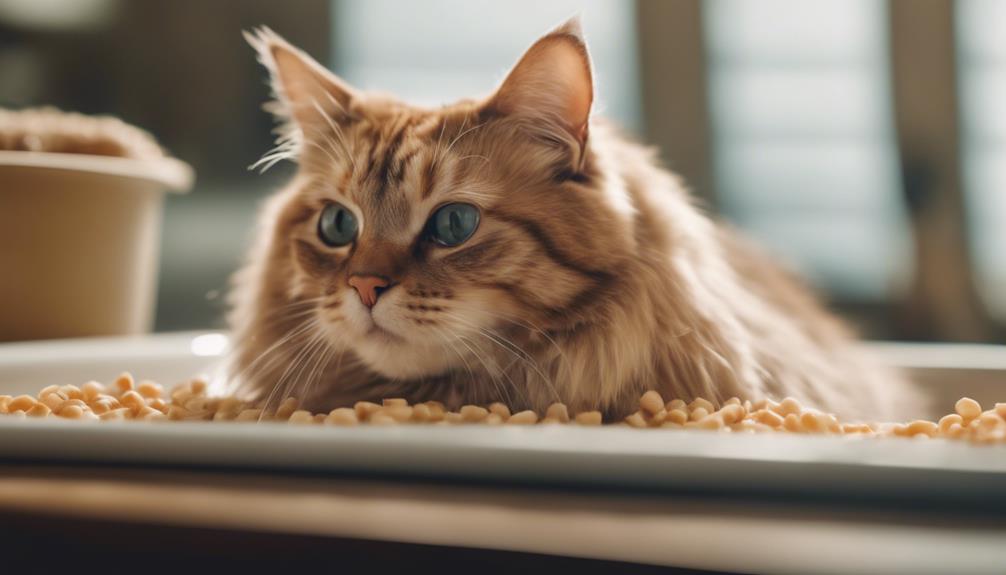When it comes to addressing cat constipation, a thoughtful approach to treatment and remedies can make a significant difference in your feline companion's well-being.
From dietary adjustments and hydration strategies to potential medical interventions, there are various paths to explore in easing your cat's discomfort.
By understanding the multifaceted nature of this condition and tailoring interventions to suit your cat's specific needs, you can help alleviate their distress and promote a healthier digestive system.
Stay tuned to discover practical tips and insights that can guide you in supporting your kitty through this challenging issue.
Key Takeaways
- Vet evaluation is crucial for diagnosing and treating cat constipation effectively.
- Home remedies like fiber and stool softeners can help manage constipation symptoms.
- Transitioning to a high-fiber diet is essential for long-term prevention of cat constipation.
- Combining professional care with at-home remedies is an effective approach to alleviate constipation in cats.
Understanding Cat Constipation
Cat constipation is a common feline health issue characterized by infrequent or difficult passage of stool. This condition often stems from various underlying causes such as diet, health conditions, or behavioral factors. Factors like frequent hairballs, low-fiber diets, obesity, or chronic diseases can contribute to this condition. Additionally, physical discomfort affecting litter box use may lead to constipation.
Understanding these causes is crucial in addressing the issue effectively. By recognizing the signs and symptoms early on, cat owners can seek appropriate treatment and remedies promptly, ensuring their feline companions receive the care they need. Stay vigilant for signs like small, hard stool, straining in the litter box, defecation outside the box, or vomiting after attempting to defecate, which may indicate constipation in cats.
Recognizing Symptoms and Signs
Early detection of symptoms and signs indicative of constipation in felines is crucial for prompt intervention and effective management of the condition. Keep a close eye on your kitty for small, hard stools or dark brown feces, which are common signs.
Additionally, if you notice your cat straining while using the litter box, defecating outside the box, or vomiting after attempting to go, these could all be indications of constipation. Being attuned to these subtle changes in your cat's bathroom habits can help you seek veterinary care promptly, ensuring your furry companion receives the necessary treatment and relief from discomfort.
Treatment Options and Remedies

An essential aspect of managing cat constipation involves implementing appropriate treatment options and remedies tailored to address the underlying causes and provide relief for the feline's discomfort. Treatment typically starts with a vet evaluation to determine the severity of the condition. Professional interventions like enemas may be necessary in severe cases.
Additionally, home remedies such as adding fiber and stool softeners can help alleviate constipation under the guidance of a veterinarian. Long-term prevention strategies include transitioning to a high-fiber diet to promote regular bowel movements. By combining professional care with at-home remedies, cat owners can effectively manage constipation issues and ensure their furry companions are comfortable and healthy.
Importance of Veterinary Consultation
Given the complex nature of cat constipation management, seeking veterinary consultation is crucial to ensure comprehensive evaluation and tailored care for the feline's well-being. Veterinarians can assess hydration levels, overall health, and address any underlying issues promptly.
In serious cases, immediate intervention such as enema or fecal extraction may be necessary, which requires professional expertise. Additionally, veterinarians can provide dietary recommendations customized to the cat's specific needs, ensuring a holistic approach to treatment.
Anal gland problems, which can contribute to constipation, are also best managed under veterinary care. By consulting a vet, cat owners can receive expert guidance on managing constipation effectively and preventing future occurrences, promoting their furry companion's long-term health and comfort.
Prevention and Long-term Care

Implementing a high-fiber diet is essential for the prevention and long-term care of cat constipation. A diet rich in fiber helps regulate bowel movements and keeps the digestive system healthy. Here is a simple guide to help you understand the best sources of fiber for your feline friend:
| Fiber Source | Description | Benefits |
|---|---|---|
| Canned Pumpkin | High in fiber and water | Helps soften stool |
| Psyllium Husk | Natural fiber supplement | Aids in digestion and regularity |
| Green Beans | Low-calorie fiber source | Adds bulk to the stool |
| Oat Bran | Rich in soluble fiber | Supports gastrointestinal health |
| Flaxseeds | Omega-3 fatty acids | Promotes overall digestive health |
Frequently Asked Questions
Can Stress or Anxiety Contribute to Cat Constipation?
Stress or anxiety can indeed contribute to cat constipation. These emotional factors can disrupt a cat's digestive system, leading to irregular bowel movements. It's crucial to address the root cause of stress in cats to prevent constipation and promote overall well-being.
Are There Specific Breeds of Cats That Are More Prone to Constipation?
Certain cat breeds, such as Persians and Himalayans, may be more prone to constipation due to their long fur and grooming habits. Breeds with brachycephalic faces, like Persians, might also have a higher risk.
How Can Environmental Changes Affect a Cat's Bowel Movements?
Environmental changes can significantly impact a cat's bowel movements. Alterations in routine, diet, or stress levels can disrupt their digestive system, leading to constipation. Cats thrive on stability; sudden shifts in their surroundings can trigger gastrointestinal issues, necessitating veterinary attention.
Can Over-Grooming Lead to Constipation in Cats?
Over-grooming in cats can potentially lead to constipation due to increased ingestion of hair, leading to blockages in the digestive tract. It is vital to address this behavior promptly to prevent further complications.
Are There Any Natural Supplements or Herbs That Can Help Alleviate Cat Constipation?
Natural supplements and herbs like pumpkin, probiotics, and slippery elm may help alleviate cat constipation. However, consult a veterinarian before administering any natural remedies to ensure safety and effectiveness for your feline companion's unique needs.
Conclusion
In conclusion, cat constipation is a common health concern in felines that can have significant impacts on their well-being. By understanding the causes, recognizing the signs, and seeking veterinary consultation for appropriate treatment, cat owners can effectively manage and alleviate this condition.
Implementing preventive measures and long-term care strategies can promote the overall health and happiness of our beloved furry companions.




